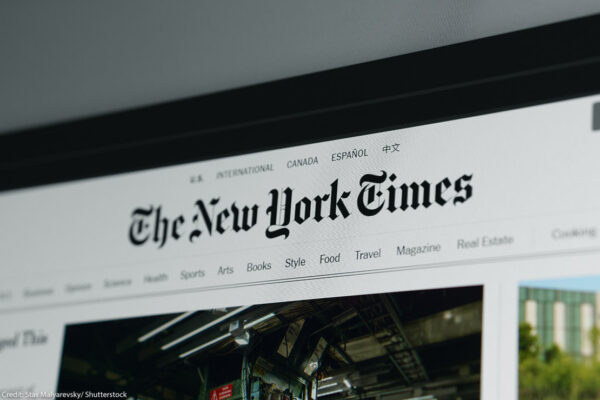Comment on Biden Revoking Trump Executive Orders Targeting TikTok and WeChat
WASHINGTON — The Biden administration revoked executive orders targeting the TikTok and WeChat apps, which were signed by former President Donald Trump. President Biden signed a new order requiring security reviews of these apps, which are owned by Chinese companies, as well as other foreign-owned tech apps.
Ashley Gorski, Ířşě±¬ÁĎ senior staff attorney, said:
“President Biden is right to revoke these Trump administration executive orders, which blatantly violated the First Amendment rights of TikTok and WeChat users in the United States. The Commerce Department’s review of these and other apps must not take us down the same misguided path, by serving as a smokescreen for future bans or other unlawful actions.”
Learn More Ířşě±¬ÁĎ the Issues in This Press Release
Related Content
-
News & CommentaryJul 2025

Free Speech
60 Years Later: How A Civil Rights-era Defamation Case Empowers The Press. Explore News & Commentary.60 Years Later: How a Civil Rights-Era Defamation Case Empowers the Press
From civil rights protests to Trump-era lawsuits, New York Times v. Sullivan continues to shape press freedomBy: Ellessandra Taormino -
News & CommentaryJul 2025

Free Speech
RĂĽmeysa Ă–ztĂĽrk On How We Can All Support Immigrants. Explore News & Commentary.RĂĽmeysa Ă–ztĂĽrk On How We Can All Support Immigrants
After a harrowing ICE detention, she’s urging others to protect immigrant rights.By: Sam LaFrance, Gabby Arias -
Press ReleaseJul 2025

Free Speech
Minnesota Supreme Court Rejects Attempt To Compel Disclosure Of Reporter Communications. Explore Press Release.Minnesota Supreme Court Rejects Attempt to Compel Disclosure of Reporter Communications
ST. PAUL, Minn. – The Minnesota Supreme Court ruled today that the Minnesota Free Flow of Information Act (MFFIA) does not have an exception for journalists who are alleged to have engaged in illegal activity, such as trespassing, when gathering news. The decision rejects an attempt by oil company Energy Transfer to compel the disclosure of sensitive reporter communications and newsgathering materials stemming from the 2016 Dakota Access Pipeline protests. “The Minnesota Supreme Court made the right call: Those who seek to pry sensitive information away from newsgatherers cannot defeat the robust protections of the MFFIA simply by alleging that the newsgatherers trespassed or jaywalked in pursuit of a story,” said Matthew Segal, co-director of the Ířşě±¬ÁĎ State Supreme Court Initiative. “A free press demands that we protect journalists from attempts to misuse the law to strongarm them into compliance.” The Ířşě±¬ÁĎ, the Ířşě±¬ÁĎ of Minnesota, and law firm Simatic & Biersdorf, PA, representing Unicorn Riot and one of its member journalists at the Minnesota Supreme Court, argued on their behalf that the MFFIA’s limited exemptions do not apply in this case. Instead, the law “is to promote newsgathering and publication, and that purpose would be severely undermined if the statutory shield were to evaporate whenever, in the course of newsgathering, a reporter allegedly trespasses, speeds, jaywalks, or double-parks.” The legal team presented oral argument to the Minnesota Supreme Court in December 2024. “For a decade we have been working to cover social struggles like the Indigenous-led movement against the Dakota Access Pipeline. The Minnesota Supreme Court reaffirmed this news gathering work is protected by the Minnesota Free Flow of Information Act. We will keep asserting the freedom of the press to cover these crucial events and political movements,” said Dan Feidt, Unicorn Riot reporter and co-founder. Unicorn Riot journalists reported on the ground from the Dakota Access Pipeline protests, gathering and publishing first-hand accounts. In 2019, pipeline operator Energy Transfer brought a lawsuit in North Dakota against Greenpeace and other entities that were allegedly involved with the protests, eventually issuing subpoenas to Unicorn Riot seeking vast disclosures of unpublished materials. Unicorn Riot refused to surrender its material, and Energy Transfer moved to compel disclosure in Minnesota. In its motion papers, Energy Transfer alleged that Unicorn Riot had trespassed on its property while covering the protests. A lower court ruled that state law prohibits the compelled disclosure of newsgathering materials, and Energy Transfer sought review at the Minnesota Supreme Court. Earlier this year, Energy Transfer’s North Dakota lawsuit went to trial, and a jury returned a $667 million verdict against Greenpeace. Greenpeace has filed post-trial motions, which are currently pending, and has signaled its intent to appeal the verdict. “The Court's decision is a welcome reminder that we value independent journalism in Minnesota,” said Teresa Nelson, legal director of the Ířşě±¬ÁĎ-MN. “This win is particularly important as large corporations increasingly attempt to intimidate reporters through litigation and in the face of unprecedented attacks on the freedom of the press by the Trump administration and other government officials.” The court ruled today that the law does not contain an exception for journalists who are alleged to have engaged in illegal activity, but it did not categorically bar trial courts from ordering journalists to produce privilege logs in response to document requests – with notable caveats. The opinion is here: /cases/energy-transfer-lp-v-greenpeace-international-unicorn-riot?document=Minnesota-Supreme-Court-OpinionCourt Case: Energy Transfer LP v. Greenpeace International, Unicorn RiotAffiliate: Minnesota -
Press ReleaseJul 2025

Free Speech
Privacy & Technology
Texas Social Media Law Violates First Amendment, Aclu Argues. Explore Press Release.Texas Social Media Law Violates First Amendment, Ířşě±¬ÁĎ Argues
SAN ANTONIO – The Ířşě±¬ÁĎ, the Ířşě±¬ÁĎ of Texas, and several other legal advocacy groups filed an amicus brief today in CCIA v. Paxton, arguing that a Texas law that restricts social media content for minors violates the First Amendment. “If allowed to go into effect, this law will stifle young people’s creativity and cut them off from public discourse,” said Lauren Yu, legal fellow with the Ířşě±¬ÁĎ’s Speech, Privacy, and Technology Project. “The government can’t protect minors by censoring the world around them, or by making it harder for them to discuss their problems with their peers. This law would unconstitutionally limit young people’s ability to express themselves online, develop critical thinking skills, and discover new perspectives, and it would make the entire internet less free for us all in the process.” The brief argues that House Bill 18 (“the SCOPE Act”) restricts young people’s ability to use social media and blocks them from viewing content they have a constitutional right to see. The law, which was enjoined by a court last year, would require minors to register their age with social media platforms and would require platforms to filter content based on an overly broad definition of “harmful to minors” that includes any content that “promote, glorifies, or facilitates” a long list of topics, including eating disorders, bullying, and self-harm. “The government should not be able to decide what’s best for every child,” said Chloe Kempf, staff attorney from the Ířşě±¬ÁĎ of Texas. “This law would isolate kids who need community support, hinder families who want their children to learn about the world around them, and open the door to sweeping bans — from Romeo and Juliet to content that is critical of the government. What’s framed as protecting our children is harming them — by censoring their access to the ideas and information they need to prepare for their futures.” The Supreme Court has repeatedly held that minors have robust First Amendment rights, including online. Even when the goal is to protect children, the brief argues, the government cannot infringe upon core expressive activity. The brief was filed in support of Computer & Communications Industry Association (CCIA) and NetChoice. CCIA & NetChoice originally filed suit against H.B. 18 in 2024. The amicus brief was filed in the Western District of Texas and was signed by the Cato Institute, the Student Press Law Center, TechFreedom, Wikimedia, and the Woodhull Freedom Foundation. The brief can be viewed online here.Court Case: CCIA v. PaxtonAffiliate: Texas